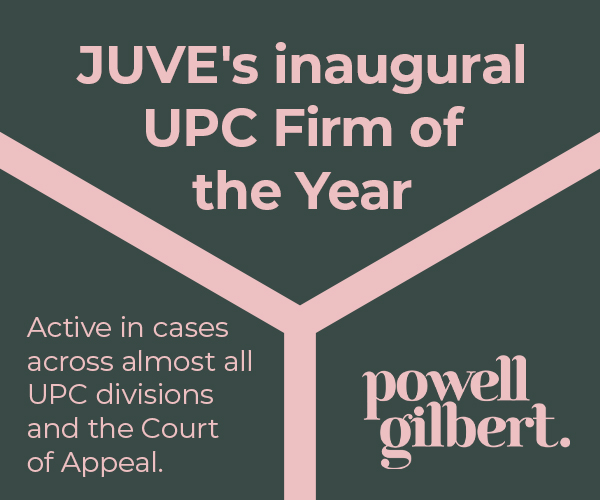Taylor Wessing launches Vienna patent practice with Schwarz Schönherr partner
On 1 April, Thomas Adocker joined Taylor Wessing in Vienna from his previous position as a partner at IP law firm Schwarz Schönherr. With this move, the international firm is responding to the new challenges posed by the Unified Patent Court while ensuring the firm has strong presence in the Austrian capital.
4 April 2023 by Mathieu Klos
Patent litigator Thomas Adocker (47) joined Taylor Wessing at the beginning of the month, to build up the patent practice at the international law firm in Vienna. Most recently, he was a partner at IP firm Schwarz Schönherr. Adocker, who joins Taylor Wessing as salary partner, is considered an up-and-coming patent litigator in the Austrian capital.
Among the few Austrian lawyers who conduct patent litigation, Adocker has one of the strongest specialisations in this area. Generally, Austrian IP lawyers provide much broader IP advice. For example, he has repeatedly appeared alongside Sandoz in lawsuits involving generic drug patents.
Vienna’s local presence
However, Adocker’s speciality could have consequences. The UPC means Austrian patent litigators are facing an uncertain future. While Vienna will host a local chamber, observers are currently unsure how often companies will sue here compared to the German, Dutch or French local chambers.
In fact, Austrian patent experts currently assume that, for the time being, parties will file lawsuits less frequently in Vienna. Once the initial dust has settled, Austrian lawyers could be involved whenever companies file lawsuits directly at the local chamber in Vienna, or if Austrian judges are involved in proceedings at other local chambers. This might extend to proceedings at, for example, the German local chambers in Düsseldorf, Hamburg, Mannheim and Munich.
Taylor Wessing chases UPC
At the same time, the UPC could draw lawsuits away from national patent courts. For lawyers such as Adocker, moving to an international firm could ensure a stable future career working for clients across a multitude of jurisdictions.
Thomas Adocker says, “At Taylor Wessing, I have the opportunity to actively shape the future path of the patents team based on my expertise. I am also looking forward to the international environment of Taylor Wessing.”
He continues, “I am specifically looking for opportunities in Taylor Wessing’s internationally positioned patent team to work on interesting and important UPC cases for my clients in the future. In a national IP boutique like my old firm, that becomes difficult. These firms rely on being involved in UPC proceedings by their collaborative partners, especially in the UK and Germany. At Taylor Wessing, I will work on UPC proceedings as a member of an international team.”
Game changer in Europe
The UPC, which will start its work on 1 June, is also responsible for nullity and infringement actions relating to the Unified Patent. In addition, the new court will have jurisdiction over all European patents already granted by the European Patent Office, provided their owners do not remove them from the UPC’s jurisdiction. At present, no-one is certain how many cases parties will file with the UPC. However, experts expect a slow but steady start.
In the long term, the UPC could lead to a concentration of cases. Instead of parties filing lawsuits in all countries where a drug is marketed, as is customary in pharmaceutical litigation, for example, a single lawsuit before the UPC will suffice for all of Europe. Experts assume that important proceedings will be concentrated in Germany, the Netherlands or France. Due to tight deadlines and high technical complexity, law firms also assume that UPC proceedings will have to be conducted with very large teams, especially on the defendant side.
Therefore, several law firms have recently enlarged their litigation teams and strengthened them internationally, in order to conduct UPC proceedings at several local chambers. In Germany, for example, Bardehle Pagenberg brought in three partners from Meissner Bolte and Eisenführ Speiser. Hogan Lovells most recently integrated a well-known partner in Amsterdam from full-service firm, De Brauw Blackstone Westbroek.
Taylor Wessing closes gap
Taylor Wessing has a strong European patent team, with a focus on the UK, Germany and the Netherlands. However, in other countries such as France, Italy or Austria, the firm has not yet produced any well-known patent experts. Until now, the Vienna office had attracted attention primarily through its trademark and competition law work around partner Martin Prohaska-Marchried.
Adocker should raise the profile of the Austrian practice. Most recently, he litigated on behalf of generics manufacturer Sandoz against Bayer over generic products for cancer drug sorafenib, a mandate which he is taking to Taylor Wessing. The firm’s Munich team is also active for the generics manufacturer in several proceedings. On the electronics side, Adocker litigated for Magna against Valeo over LED headlights for cars.
Martin Prohaska-Marchried, who leads the Central and Eastern Europe IP team, says, “Thomas’ comprehensive expertise with multinational cases makes him a highly valuable member of Taylor Wessing’s IP team, and in particular of our patent litigators in the UPC territory. We are very much looking forward to working with him.”
Blow for Schwarz Schönherr
While the addition of Thomas Adocker is a boon for Taylor Wessing, the boutique Schwarz Schönherr must now reorganise its patent practice. The firm had recently concentrated its patent work primarily on Adocker. The firm already has a very strong focus on soft IP issues, where it is one of Austria’s market leaders.
For example, it advises numerous international fashion labels on product piracy. Schwarz Schönherr will continue to provide trademark law services to the Novartis Group and its generics subsidiaries Hexal and Sandoz.
However, name partner Georg Schönherr is also experienced in patent litigation. To strengthen its chances for UPC proceedings, the firm must establish closer ties with similarly positioned law firms in other UPC countries. Schwarz Schönherr, like other Austrian IP boutiques, is limited in this respect because it depends on many referral clients, especially from German IP law firms. Exclusive cooperation is therefore unlikely.

